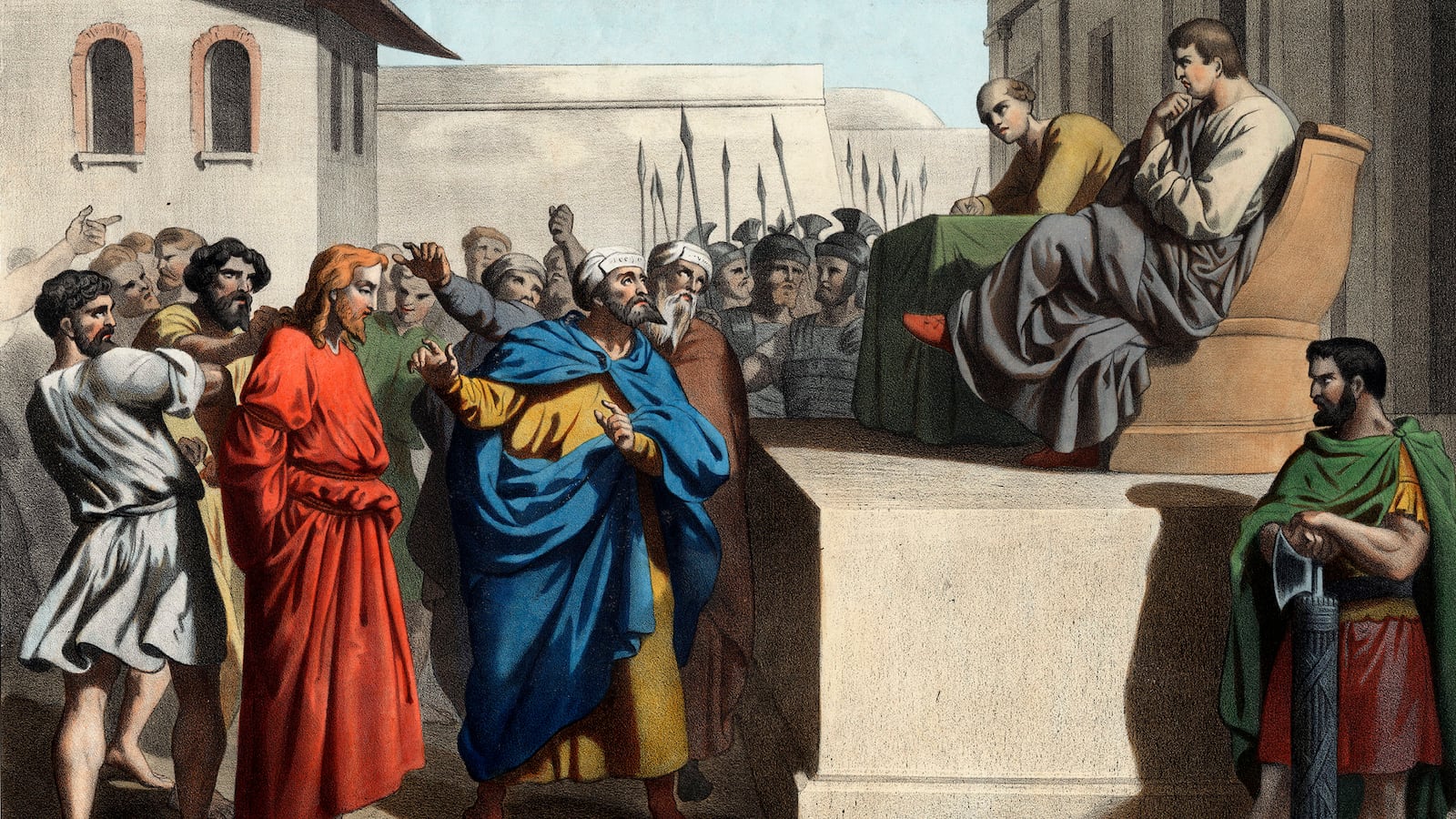We live in an age of Pilate politics.
Pontius Pilate is a familiar figure to many of us, especially on this Easter weekend. He was the Roman governor of Judea and Samaria, tasked with collecting taxes, building roads, and generally maintaining order in the region of the world we now know as the West Bank. Pilate served as a critical part of the Easter story, a vital, brutal, link between Jesus's life on this earth, and his death on the cross.

The crowds in Judea, goaded on by the Sanhedrin and angered that Jesus would not deny that he was the Son of God, demanded that Jesus be crucified. Pilate—despite his wife's warnings to the contrary and, according to Matthew's Gospel, with a fair amount of hesitance—caved to the crowd's demands. In sending Jesus off to his death, Pilate cemented his place in history as a metaphor for failed leadership; his has become one of those names, like Jezebel, that you wouldn't think about bestowing on your kids.
But perhaps it's time to take another look at old Pilate—he may be more like us, and our leaders, than we care to admit.
Like many politicians today, Pilate had a lot of worldly stature to lose. The Roman Emperor at the time, Tiberius, had given Pilate a cushy, 10-year appointment as Prefect, when most terms in that role were less than three years. Any rocking of the boat—like the grassroots revolt that might have been provoked if he saved Jesus—would not sit well with his bosses back in Rome.
And like a lot of our leaders, Pilate had to be responsive to the demands of his base. At a festival that sounds a bit like a modern town hall forum, Pilate went before a throng of people and tried to reason with them, offering up Barabbas, a real criminal, to be put to death instead of Jesus. The crowd was having none of it, and, perhaps sensing that it was either him or this odd young carpenter from Nazareth, Pilate chose to save his own skin. The only people who would have supported Pilate if he chose otherwise were the poor, radicals, outcasts—people who could do nothing for him.
Of course, the consequences of Pilate's decision have no modern analog; there's no Easter equivalence, no aspect of our policy or politics that compares to the horror of Jesus's death, and hope of his resurrection.
But in seemingly benign ways every day, our leaders still practice a lesser form of Pontius Pilate politic—with dangerous, deadly consequences.
Pilate politics is when a governor, in the face of thousands of lives that could be saved, still chooses to deny Medicaid to people in his or her state, due to some gauzy longitudinal theory or misplaced fiscal principle. Sure, it would be tough for red state leaders to choose otherwise--elections have been lost over less--but Pilate's decision was a tough one, too.
Pilate politics is when, year after year, from Chicago to Newtown, we lose thousands of our citizens to the red flash of a gun and searing penetration of a bullet, and still refuse to have a thoughtful conversation and seriously legislative debate about violence in our society, and rational access to weapons by criminals, young people and the mentally infirm. The NRA is gathered in a crowd, screaming in the public square, and there are few incentives for elected officials in purple and red districts to cross them. But let's not deny that there are lives are at stake, and that this is still pure Pilate politics.
Pilate politics is when, in the face of somber fiscal projections and mounting municipal, state and federal debt, Democrats refuse to demand action on deficit reduction and entitlement reform, for fear of crossing their own base. Bankrupt cities and debt-saddled children a generation from now are apparently no match for progressive email campaigns today; it’s Pilate politics in raw form.
And Pilate politics is when, after thousands of children have seen one of their parents deported, and hundreds of bodies of our fellow human beings have been left to die on a desert border, we still have no life-saving, family-uniting action on immigration reform. Through their action or inaction, some of our leaders are still effectively looking at immigrants with disdain, shouting incoherently about law and order, and yelling, "crucify them!" The worst sort of Pilate politics.
So let’s not quickly dismiss Pilate; he wasn't that bad of a guy. He had motivations, a base, and reasons for his actions that made sense to him at the time. The result, though, was still the same.
It's a difficult thing to go against the will of the crowd, to buck the norms of a given party, system or age—but in doing so, you never know who you might save. Perhaps on this Easter weekend, instead of disdaining Pilate, we can seek to understand him and therefore be less like him, and in doing so, become more like Christ.





